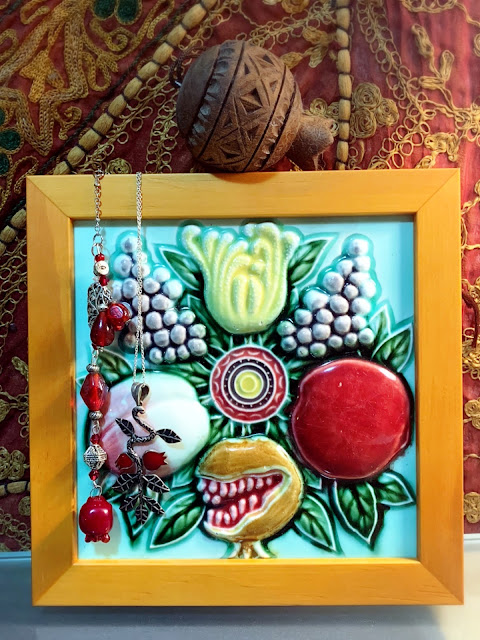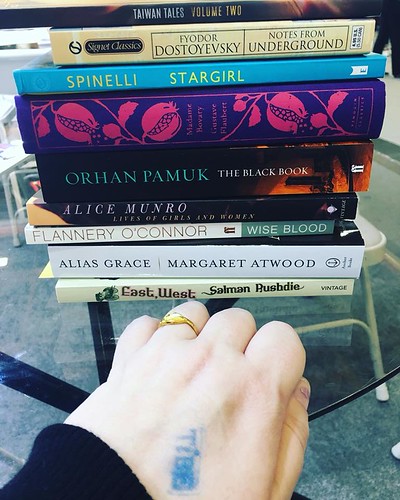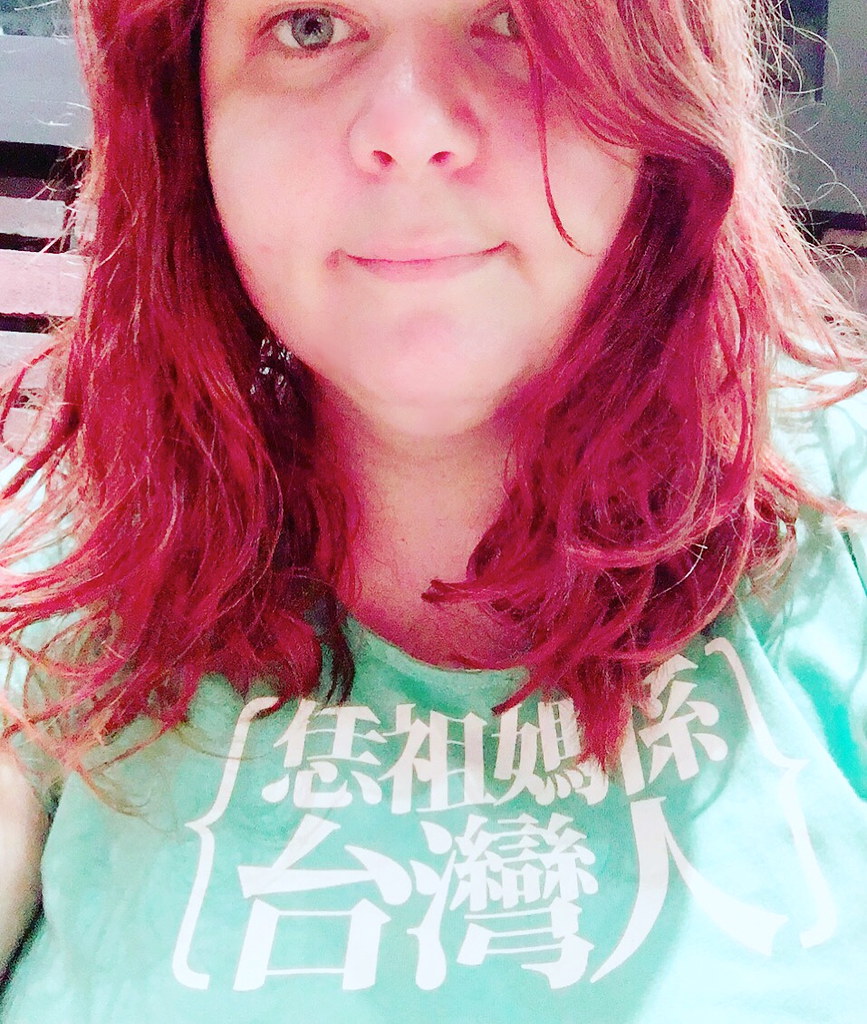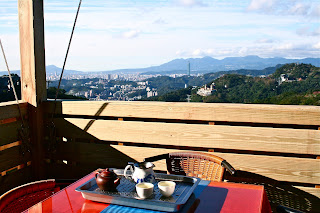A Majolica tile from a long-gone Taiwanese farmhouse with pomegranate-themed jewelry and ornaments from Armenia (the beaded necklace is my own work, featuring an Armenian glass pomegranate)
In Armenia, the pomegranate also symbolizes resurrection (many arils mean many lives) and the "unity of many under one authority". As an atheist and anti-authoritarian, I'm not particularly interested in the Christian flavor of all this, but as a country, Taiwan seems to have done well as a collective of many individuals working together to beat the pandemic, under the sound guidance of the CECC.
This was not an abundant year. It was not particularly prosperous or fertile. But it was a lot: in addition to all the pandemic-wrought difficulties, many small, tart arils did come together to form a semi-coherent whole. In the bevy of little things from 2021, I managed to unearth ancestral connections I'd thought were lost forever and carve out some new understandings of my own heritage.
Metaphorically speaking, 2021 handed me pomegranates. That's far from the worst thing, though they take a lot of work. From that bevy of tart little arils, I made a pomegranate-themed meal.
First, the writing. Interested readers can find my piece on Bilingual by 2030 and the possible benefits of an Intercultural Communicative Competence model in Taiwan Insight, my piece on Taipei's Railway Department Park in the winter issue of Taipei Quarterly (as well as a piece on Japanese heritage sites in their autumn issue). I'm working on something for Ketagalan Media on the use of technology to bridge the urban-rural education divide, but it's not ready yet.
I was happy to learn that, at least for British and Irish spouses of Taiwanese citizens, the bureaucratic snafu making it impossible for them to enter Taiwan on spouse visas has been resolved after I wrote about the issue (though I don't think there's a direct relationship between my article and the resolution of the problem). I finally tackled one of my long-time bugbears in Ketagalan Media as well, dispelling myths about the supposed "Confucian" nature of Taiwanese education.
Then, the photos. To say that a lot of my attention has been diverted from Lao Ren Cha over the past year would be an understatement. I spent most of the 'soft lockdown' during the Taiwan outbreak cataloguing and identifying a large cache of family photographs that fell into my hands after my mother passed away in 2014, which I've kept in a 'dry box' (a dehumidifying cabinet) to preserve them from the ravages of Taiwan's humidity. Most of these are from the 1920s and 30s, from the Armenian refugee settlement of Kokkinia in Athens, Greece. Kokkinia is now a typical urban neighborhood where some Armenian families still live, with both Armenian Apostolic and Protestant churches. Some, however, are far older.
I realized as I did this work that the photographs themselves hold historical value: not many photographs from survivors of the Armenian Genocide made it across the Atlantic. So, I collaborated with a historical society to donate and preserve high-quality digital copies of these images. You can see the results here.
Here are a few examples. I don't know who this couple is, but I suspect they're my great-great-grandmother's parents:
And this is my grandfather as a child in Athens:
In identifying these photos, I came across the work of Vahram Shemmassian, the only person who seems to have conducted serious academic research on the Armenians of Musa Dagh. Let me just say, it's a strange feeling to come across images of one's direct ancestors, as well as historical accounts that mention them directly, in academic work. This reading, in addition to other genealogical research, reminded me of something once said to a friend, when showing him a picture of my great grandfather in his fedayi (freedom fighter) outfit, during his time with the Armenian Revolutionary Federation (ARF, or the Dashnaks if you're knowledgeable about this sort of thing). Other unexpected sources have surfaced as well.
I told him that while certainly Taiwan's history is not my history -- my family isn't from here, I just happen to be here -- when I read and hear about the way the KMT treated Taiwan during 228 and the White Terror, and the rhetoric China uses to dehumanize Taiwan as it threatens subjugation and massacre, I do see parallels in what my own ancestors lived through. They're not the same thing -- nothing is ever exactly the same -- but the same dynamic of one group illegitimately claiming control of another group's heritage, culture, territory and yes, wealth while either threatening or conducting a massacre? Yes, I know that story. Watching the rest of the world dandy about "analyzing" these issues while debating "the Armenian Question" or the "Taiwan Question" as though these are abstract debates and not real people? I know that too.
Anyone with a shred of human empathy is able to understand this, of course, but knowing through my own history that the same playbook has been used before has had me thinking. Where that thinking will lead, I don't yet know. Writing on Lao Ren Cha increasingly feels like adding to a palimpsest: writing about Taiwan now, which evince the cultural memories of what came before.
I made some decisions about education, too. In 2020, I realized my long-held dream of going to graduate school. In 2021, I decided I would most likely not pursue a PhD. I found academia supportive and welcoming, and I certainly did well. Issues of geography can be overcome. Funding is more difficult, but theoretically possible if I chase it. I certainly would not pay for a PhD program -- either it's fully funded or I don't go.
But the fact is, there's not much waiting for me on the other side of that gauntlet: I'm not willing to leave Taiwan, and there are essentially no good academic jobs in Taiwan for a language acquisition specialist -- the adjunct and annual contract work that does exist would entail a pay cut without putting me on the road to qualifying for dual nationality. That means I'd be doing a PhD quite literally for fun, because it wouldn't change my career trajectory.
Besides, it looks like Brendan's likely to be starting his own Master's program soon. I needed his support to get through mine, keep a household running and work. He'll certainly need mine.
All that to say, 2021 wasn't a wash for us. The summer was hard, but we made it through, and having an "okay" year seems to be a win by global standards right now. And that's what it was -- okay.
You can tell a pomegranate is ripe not by its smell at the base as with a pineapple or melon, nor by how hollow it sounds when you knock it, as with a pumpkin. Rather, look for firm, flat sides -- a rounded pomegranate isn't ready. The color doesn't matter much, but weight does; the heavier it is, the better. All that work into family history, decisions about higher education, writing, reading? I'm not sure it all adds up to anything -- a bunch of arils, or one ripe fruit? Who knows. But I do feel weightier, more angular, perhaps ready for new things.
What new things? I don't quite know. Perhaps not academia, but there are other options.
How did we end 2021? With a feast that honored what defined my 2021: connections to a cultural heritage that I always knew about and even grew up within (well, the Americanized version of it). An Armenian Christmas dinner, created from scratch by the two of us working together. We fed fifteen people, old friends and some new; we filled up the maximum space available in our Taipei apartment for a true sit-down meal.
Did everything include pomegranate? Of course not. But this is Armenian food -- it's safe to say most of it did.
We started out the meal with mezze. Hummus, beloved by Armenians. Babaghanoush and caçik, beloved by Turks and Armenians alike. Tabbouleh, more Syrian in origin but something my ancestors certainly ate. Muhammara, also Syrian, consisting of roasted red bell peppers flavored with Aleppo pepper (smoked paprika or cayenne will do) and pomegranate molasses, garnished with sumac, chopped walnuts and pomegranate arils Badrijani nigvziani, which is more of a Georgian thing but has a related flavor profile -- it's walnut paste with garlic and lemon rolled in roasted eggplant and topped with pomegranate arils. No Armenian mezze table would be complete without a big bowl of mixed olives. We served green (probably cerignola), kalamata and thasos.
Then the main courses: lamb with plums and honey, a dish I ate at Kchuch, a restaurant hidden in a wooded grove in Dilijan, Armenia, washed down with pomegranate wine. Pomegranate molasses chicken garnished with slivered almonds. Dolma, which are vegetables stuffed with spiced and herbed bulgur and ground lamb (we call stuffed grape leaves sarma, not dolma). Rice pilaf, made just the way my grandmother used to, with a whole stick of butter. Ghapama, a pumpkin stuffed with rice, honey, butter, cinnamon, nuts and dried fruits and baked until tender. It's so good that there's a whole song, complete with trippy 1980s video, about how if you cook it everyone will come to your house.
And of course dessert: I went a little off-course here and made a British-style Christmas cake, but supplemented that with spiced walnut-stuffed cookies, made only by my Aunt Rose (Vartouhi). She would cut herringbone patterns in the top and call them "fish cookies" for the way they looked. Hers looked perfect, but they tended to be a little dry and hard. Mine looked like severed fingers but were tender and delicious.
Instead of posting a string of photos, here's a collage I stole from my friend June. It doesn't have every dish (the pilaf, muhammara and lamb with plums and honey are missing), but it'll do:
Everything you need to cook like this can be procured in Taiwan, by the way. Here's a quick key to some of the more difficult ingredients: I got the fine bulgur on Shopee. Parsley, fresh mint and dill can be found at Binjiang Market (though ultimately we went to City Super and certainly paid more as a result). Although my pomegranate molasses comes from the US, you can get it on Shopee, too. If it's unavailable, unsweetened pure pomegranate juice is an acceptable substitute in muhammara -- City Super at the Far Eastern Hotel sells small bottles of the juice. Chimeidiy (Chimei DIY) sells the correct tahini, though you can make it yourself with sesame seeds, and the local sesame paste is an acceptable substitute. They also sell walnuts in bulk. Trinity Indian Market has any spices you can't procure at Jason's, the Eslite market or Carrefour. You'll need some hard-to-find ones like allspice, celery seed, nigella (kalonji), dill weed, dried mint, cumin, coriander seed and both hot and mild smoked paprika. Levant Taiwan Halal Meat has cubed lamb and can arrange ground lamb (the Braai Guy helped me out this time, but he doesn't usually carry it).
Costco has Greek yoghurt, pita and goat cheese.
The next morning, I noticed we still had half a pomegranate, its arils tucked neatly into a firm red shell. I cracked and peeled until the bounty fell out, and ate them straight from the bowl.
Yesterday, I bought another particularly nice-looking pomegranate at the supermarket. Angular and heavy, it was ready to be cracked open.

























